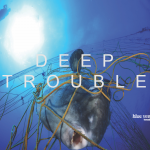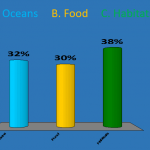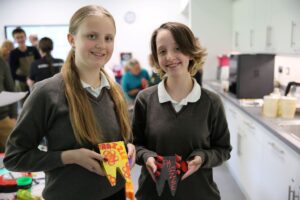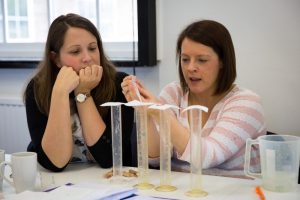Vote NextGen Earth, the Great Debate
Wednesday 5th July 2017

It was very enthusiastic audience that met with our three panellists at Masters of Disaster: NextGen Earth, an interactive, proleptic, and kind of apocalyptic sustainability discussion that formed part of the Oxfordshire Science Festival and Oxford Green Week this June.
Armed with voting pads, the audience scrutinised the speakers as they pitched their concerns about our oceans, habitats and food sustainability, an interlocking and inter-dependent entanglement of issues that all stem from one thing – human beings.
We discussed energy technology, climate change and carbon monitoring, the impact of the oceans on our health and lifestyles, and cultural shifts away from smoking, single-use plastic and meats such as lamb. The speakers vied for the audience votes that would give their protective and remedial measures a chance to change the world.

Named endearingly by the audience as ‘Sea Guy’, Steve Rocliffe from Blue Ventures pitched the need for recovery zones for fisheries, community-led changes in fish farming policies, and immediate ecological protection of the reefs as they are now, and not as they were yesterday.
‘Land Guy’ James Bullock from the Centre for Ecology and Hydrology called for the immediate restoration of 15 per cent of the world’s degraded habitats, including artificial reefs and wildflower growing to encourage biological pest management, an investment project with relatively quick payback in terms of hard cash.
 John Ingram from the Environmental Change Institute, University of Oxford (aka ‘Food Guy’) delivered his pitch on balancing supply and demand – both up and down – managing demand by encouraging a cultural move away from unsustainable food sources like beef.
John Ingram from the Environmental Change Institute, University of Oxford (aka ‘Food Guy’) delivered his pitch on balancing supply and demand – both up and down – managing demand by encouraging a cultural move away from unsustainable food sources like beef.
“The audience had a lot they wanted to say and ask,” said Michaela Livingstone, event Chair and Public Engagement Facilitator at the University of Oxford; “This is clearly an area where people are keen to know more and contribute their ideas.”
Michaela manages Oxford Sparks, a platform that brings together resources and resources and information about research across the university (oxfordsparks.ox.ac.uk).
“And y’know, love the format,” she adds: “Researchers should use formats like this more often – it’s an engaging and fun way to foster some serious discussion and encourages participation from both parties.”
 As well as asking probing questions at this fast-paced intensive discussion, the audience also voted with a razor-sharp determination, keeping the tables relatively well balanced between the three challenges of protecting our oceans, land and food throughout, and not giving away too much of their allegiances.
As well as asking probing questions at this fast-paced intensive discussion, the audience also voted with a razor-sharp determination, keeping the tables relatively well balanced between the three challenges of protecting our oceans, land and food throughout, and not giving away too much of their allegiances.
We concluded that all three are fairly evenly important – the important thing now is to embrace action!

Blog by Rowena Fletcher Wood
Programme Delivery Officer
Science Oxford



